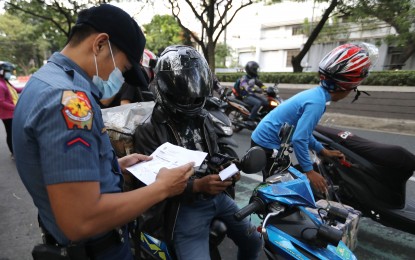
CHECKPOINT. A Quezon City Police District (QCPD) personnel checks the documents presented by riders along Kalayaan Avenue in Quezon City in this photo taken Dec. 4, 2022. Senator Raffy Tulfo filed a bill seeking to regulate police checkpoints in order to stop discriminatory practices and serious violations from irresponsible and abusive checkpoint personnel, especially to motorcycle riders. (PNA photo by Joey O. Razon)
MANILA -- Senator Raffy Tulfo has filed a measure seeking to regulate police checkpoints in order to stop discriminatory practices and serious violations from irresponsible and abusive checkpoint personnel, especially to motorcycle riders.
In filing Senate Bill No. 1977, or the Checkpoint Regularization Act, Tulfo noted that more often than not, police officers stop riders at makeshift checkpoints and require each and every one of them right then and there to present several documents like license and registration, inspect their compartments and even subject them to body searches, without first explaining the reason for the checkpoint, point out any traffic violation nor having reasonable suspicion that a crime has been committed.
On the other hand, he said four-wheel vehicles are not inspected at the checkpoint, thus creating an impression that checkpoint personnel are being selective in their searches.
The proposed bill seeks to establish guidelines for checkpoints that shall be “uniformly implemented” for all motorists whether they are driving two, three, or four-wheeled vehicles to further prevent the profiling and discrimination of motorcycle riders.
“This bill seeks to regulate the establishment of checkpoints in order to prevent any other infringements of the constitutional rights of people against unwarranted searches,” Tulfo said.
He said that the “plain view doctrine” must be observed in the conduct of inspection of all vehicles during a routine checkpoint.
SB 1977 states that “the conduct of inspection of all vehicles, including motorcycles, during a routine checkpoint is limited to a visual search, occupants are not subjected to a physical or body search, and therefore must be done with due respect to the innocent passers-by, commuters, or bystanders, and must be conducted in a manner with the least inconvenience to the public.”
“Here, the police cannot ask drivers to step out of your car or get off the motorcycle, inspect it, submit to a physical or body search without their permission,” Tulfo said.
Under his measure, police officers manning checkpoints can only demand to see the motor vehicle operator’s license and registration only if they observe any traffic violation such as damaged light, lack of plate number, and failure to wear helmet for riders.
The only time police officers can proceed to implement the “stop and frisk” procedure is when they have reasonable suspicion that a crime has been committed immediately before or at the checkpoint.
“Due courtesy must be accorded to motorists, traders, and commuters during the conduct of the checkpoint,” the bill stated.
“Police personnel assigned to the checkpoint shall not mulct, extort, or harass drivers, passengers, and traders,” it added.
Any violation of the provisions of this Act shall be punished with the corresponding penalty prescribed by the Revised Penal code in addition to any administrative sanction that may be prescribed by the Revised Penal Code, including any administrative sanction that may be prescribed by law.
No problem
The police force, meanwhile, welcomed the measure but clarified that the setting of checkpoints is a normal part of security operations.
“We understand that there are instances where riders are getting inconvenienced with checkpoints but we want to appeal to everyone that the PNP is not doing this to disturb motorists but to ensure the safety of everyone,” PNP spokesperson Col. Jean Fajardo said when sought for comment.
Fajardo said the PNP is ready to provide inputs to the proposed bill and will continue to implement measures that will improve law enforcement operations. (with report from Lloyd Caliwan/PNA)
